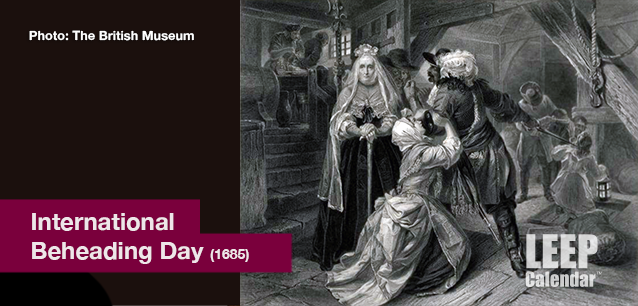 AD
AD
Today is: November 15
Scroll to explore events active on this date.
Additional Events on LEEP
LEEP INK FEATURES

August? Absolutely!
In August, we live through the Dog Days of Summer. It's hot and often humid, and those who can leave for better climates do. Down south, winter is in full force. August is also known as "the ...

In The Heat of July: July 2025 Events
Is it hot enough (or cold enough if you're below the equator) for you yet? There is actually a day for that! Like every month, I pick a diverse collection of events you may or may not know about. This ...

May Blooms: Events in May 2025
Along with October, May is one of the most densely packed months of the year. It's before the summer humidity and the last whole month of the school year. The weather is warming in t...
About International Beheading Day
Military , Legal
Ends: Sep 02, 2025
DESCRIPTION:
International Beheading Day marks the anniversary of the execution of Lady Alice Lisle on September 2, 1685, at the age of 63.
Lady Lisle was part of the English gentry, and her crime was treason. She was found guilty of harboring John Hickes in her residence. Hickes was a preacher and non-conformist (at the time a severe crime) who participated in the Monmouth Rebellion against the king at the Battle of Sedgemoor.
At her trial, Lady Lisle insisted she did not know that he was a wanted man and was offering shelter. Despite not knowing she was breaking the law, The Crown declared her guilty of treason, and her sentence was death.
What makes Lady Lisle's execution unusual is motive. Evidence later revealed it was a revenge killing, a judicial murder ordered by Judge Jeffreys. The judge was engaged in several disagreements with Lady and Lord Lisle, and presiding over her trial, and passing her sentence, allowed him to settle a score.
Today we refer to this as judicial misconduct and, depending upon circumstances, murder.
The trial and beheading of Lady Lisle initiated reforms in England promoting the recusing of judges, litigators, government officials, and barristers involved in a trial where bias, personal gain, or affiliation could hamper their ability to uphold the law or serve impartially.
Parliament issued Lady Lisle a posthumous pardon due to "the menaces and violence and other illegal practices" of Judge Jeffreys.
The last beheading in England occurred in 1747.
VIDEOS
Currently, this event does not have supporting videos.
SUPPORTING DOCUMENTS
Currently, this event does not have supporting documents.
ADDITIONAL IMAGES
Currently, this event does not have supporting images.
Where would you like to go now?
 AD
AD


/footer-logo.svg)
